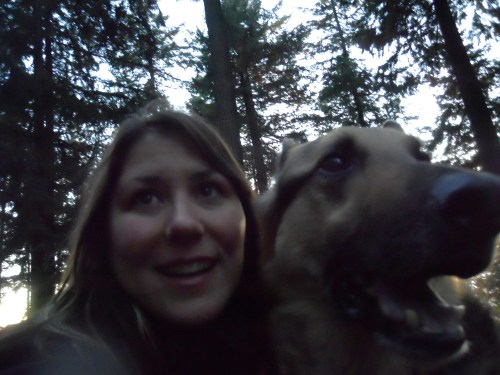“Hold on to the corners of today, and we’ll fold it up to save until it’s needed. Stand still. Let me scrub that brackish line that you got when something rose and then receded.”
–John K. Samson, “Watermark,” Lyrics and Poems, 1997-2012
Now that I have opened the floodgates to a subject I had been assiduously avoiding, I might as well dive in with both feet. Besides the two kinds of memory discussed in “A past that has written itself on you,” I think there is a third, which may or may not be real but in which I have decided to believe –another recurring theme in my Alec writings, just like that iconic poster in Fox Mulder’s office:

The literary term “redux” means “brought back, restored, revived.” Between our faulty and unreliable episodic memories and the indelible bone deep “memory” of a past that has become part of our essential self are the memories that live in our subconscious, sleeping away. Because we can hold only so much data in the accessible regions of our brain, these other memories slip into our subconscious, into the locked vaults. But they are still there. And we do hold the key. Even if we don’t know how to use it yet. That is my theory. And in knowing how episodic memories inevitably fail and deteriorate, I think of the vaults as sort of a safekeeping device. Even if we cannot — and perhaps, more precisely, because we cannot — access them at will, they are preserved. If we could access them they would fade, become distorted, and succumb to the other perils of episodic memory. But because they are safely tucked away they remain intact, pristine.
You may ask, what good are these memories if we can’t access them, if indeed they are locked in our subconscious. They may as well not exist at all then, right? Well, yes and no. I believe we should be comforted knowing (or believing) these memories are there, knowing that if we kept banging on the door to get in and view them, we would ruin them.
I think if we ever REALLY need those memories we can have them. But I also believe if we pull them out to much to look at them, they will start to fade and disappear. This is another (or maybe the main) reason I avoided the photos for so long; I want them to be fresh, and repeated viewings of any static item inevitably make it stale. But this slip into distortion and staleness, like the episodic memories, is unavoidable. It’s what time does, and our memories and photos are just artifacts. They are not the thing. “The thing” lives in our bones. But what about these memories sleeping away in some hidden corner of our brains? Ah, what of them?
I had a conversation with my friend Sophie sometime after Alec died. She had a special relationship with her dog Promise, which seemed similar in many respects to the bond Alec and I had, and she struggled with losing him too soon (to cancer as well). One day she mentioned she was at a stage in her grief where she was starting to forget the little details (the feel of the fur, the weight of a paw) and this realization was of course upsetting to her. I was in a different stage, one where I could not even think about Alec. This stage lasted quite awhile for me. I kept shoving my thoughts and emotions down when they came, batting them away reflexively, because I simply could not deal with them. It was a stage characterized by numbness and denial.
While Alec was sick, while he was dying, I wrote furiously in my journal every day. Toward the end I feel like I was writing in it almost constantly. Nothing profound, just details, details, as if I could contain him in the pages. It was a lifeline for me. After he died my journal turned into a crazy place that made no sense. Sporadic entries scrawled large across the page in some insane person’s handwriting that I didn’t recognize. I eventually stopped trying to write (until I tentatively stepped back onto this blog). But during this time of non-writing, I would sometimes record little details about him in a notebook, terrified I would forget.

 Around this time, as I was lying in bed trying to fall sleep, an image popped into my mind of the soft wispy fur on Alec’s chest between his front shoulders, how it felt, the way I liked to press my cheek against it. Random. I snapped on the light and jotted it down in my notebook (always this faith that words will save me).
Around this time, as I was lying in bed trying to fall sleep, an image popped into my mind of the soft wispy fur on Alec’s chest between his front shoulders, how it felt, the way I liked to press my cheek against it. Random. I snapped on the light and jotted it down in my notebook (always this faith that words will save me).
That night I had a vivid dream, in which I was pressing my face to Alec’s chest. I could feel his soft wispy fur against my cheek. It seemed so real. When I woke, up it felt like a gift. And that’s when I created my theory — that our brain contains it all, even without us writing it down. It comforted me, so I kept it like a charm. And I told myself that even if I didn’t dream about him every night, there was always the possibility it could happen again. And that it would feel just as real. The promise of a secret world. We take our comfort where we can, and to me this was a tiny balm during a very bad time. I did not examine this too closely, just trusted it and tucked it away.
Since I now believe in ghosts (we take our comfort where we can), I talked with various animal communicators and also just people who are open to that sort of thing. I was distressed I did not see Alec or feel him around me after he died. I read lots of accounts of this happening. Why not with us?? Especially when the only way I got through his death was to tell myself we would still be together; we just had to figure out a way to cross the great divide. (No, I don’t care how nutty that sounds; this is how I kept myself going and it felt like the only option at the time.) Anyway, that really bothered me. I had full expectation I would feel him after he died. Even if it was my wishful mind conjuring him, whatever…I didn’t care that much. That distinction would be something to worry about later, but later never came because I never saw him! Why didn’t he come back to haunt/visit me?** Didn’t he LOVE me?? Etc!
**I pray one prayer. . . may you haunt me, then!…I know that ghosts have wandered the earth. Be with me always – take any form – drive me mad! only do not leave me in this abyss, where I cannot find you! Oh, God! It is unutterable! I cannot live without my life! I cannot live without my soul! — Emily Bronte, Wuthering Heights, p. 167
It was suggested to me by more than one person that I might be trying to hard. This could be my problem, why I could not sense him. So I tried not trying too hard, but you know how that goes. (Warning: this is where things get pretty woo woo.) Someone also told me that when our “vibration” is high we are more likely to connect with the spirit world or whatever. High vibration means basically that we are happy and in a positive, peaceful place. We would be vibrating at a low frequency if we are miserable, depressed, angry, etc. So this lady said being too depressed and sorrowful can interfere with our attempts to connect with…well, I will just use “ghosts” as a shorthand, but I mean this whole other hypothetical world that we cannot see. And I think this is also related to the memory issue. More on that in a minute. I promise this is going somewhere.
That was sort of a roundabout introduction to talking about CS Lewis’s A Grief Observed, which was sitting on my coffee table for about a year before I finally got around to reading it. I really liked it. At just 76 pages, it’s a slim volume that documents his personal struggle with the universal issues that affect us all when we lose a profound love, and his grief, like so many, is complicated by the special factors that make each relationship unique. Although much of Lewis’s struggle revolves around him questioning his god and faith in the aftermath of the death of his beloved wife, many of his reflections resonated with me.
In Lewis’ case, he and “H.” – the great love of his life – had only been together a short time when she was stricken by cancer. It was as if they had waited their whole lives for one another and then, just when they finally found each other, were ripped apart. Lewis was a deeply religious man and his faith in god was shaken by the circumstances surrounding her death. While I did not question “god,” I did question my whole existence (something I had not done with such verve since high school) and these existential questions can be as, if not more, alienating I think. Lewis eventually finds his way back to god, but the existential questions have no comforting answers, at least not to me. (I am also reading Frankl’s Man’s Search for Meaning. Maybe it will help! I am still looking for answers though I suspect none will be forthcoming.)
Anyway, it’s a good book! Highly recommended for the bereaved, especially those who find comfort in reading about other people’s experiences, as I have. Long introduction! So this passage (on pages 44-46) reminded me of the themes I have been trying to unpack above. For Lewis, bad day follows bad day follows bad day until, on this particular day, he finally experiences something different:
Something quite unexpected has happened. It came early this morning. For various reasons, not in themselves at all mysterious, my heart was lighter than it had been for many weeks. For one thing, I suppose I am recovering physically from a good deal of mere exhaustion. And I’d had a very tiring but very healthy twelve hours the day before, and a sounder night’s sleep; and after ten days of low-hung grey skies and motionless warm dampness, the sun was shining and there was a light breeze. And suddenly at the very moment when, so far, I mourned H. least, I remembered her best. Indeed it was something (almost) better than memory; an instantaneous, unanswerable impression. To say it was like meeting would be going too far. Yet there was that in it which tempts one to use those words. It was as if the lifting of the sorrow removed a barrier.
Why has no one told me these things? How easily I might have misjudged another man in the same situation? I might have said, ‘He’s got over it. He’s forgotten his wife,’ when the truth was, ‘He remembers her better because he has partly got over it.’
Such was the fact. And I believe I can make sense out of it. You can’t see anything properly while your eyes are blurred with tears. You can’t, in most things, get what you want if you want it too desperately; anyway, you can’t get the best out of it. ‘Now! Let’s have a real good talk!’ reduces everyone to silence. ‘I must get a good sleep tonight’ ushers in hours of wakefulness. Delicious drinks are wasted on a really ravenous thirst. Is it similarly the very intensity of the longing that draws the iron curtain, that makes us feel we are staring into a vacuum when we think about our dead? ‘Them as asks’ (at any rate ‘as asks too importunately’) don’t get. Perhaps can’t.
I love this! It’s the same idea as the vibration thing. And this notion that trying too hard, not only to commune with the dead but also to remember them (in itself a type of communion), can be a block to that which we want so desperately: to be with them, and/or failing that, to remember them with precision and in living color. Consider these, my favorite sentences in that lengthy passage:
- And suddenly at the very moment when, so far, I mourned H. least, I remembered her best.
- He remembers her better because he has partly got over it.
- It was as if the lifting of the sorrow removed a barrier.
- You can’t see anything properly while your eyes are blurred with tears. You can’t, in most things, get what you want if you want it too desperately…
There is something here, some measure of comfort, right? These words help us to persevere, knowing that something better waits as we move into another stage of our grief (not a shameful word but a lifelong process! As much a part of life and love as anything else). As we fumble for meaning and secretly fear that feeling happy is a betrayal (this creeps in even as we know it is irrational), we might do well to realize that those first tentative steps into sunlight, rather than carrying us farther away from our loved one, may in fact be one of the keys to the kingdom we feel we have been locked out of forever.












